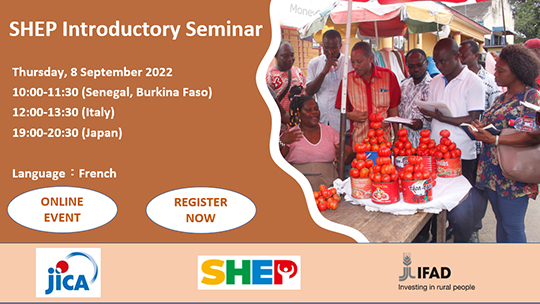SHEP Introductory Seminar Report
Day:2022.09.08
event |

Seminar Name: Introductory Seminar on Smallholder Horticulture Empowerment and Promotion (SHEP) Approach for Francophone Countries
Date: September 8, 2022
Organizer: International Fund for Agricultural Development (IFAD) / JICA
Location: Online
Language: French
[Speakers]
Opening Remarks
Mr. Tarek Ahmed, Lead Portfolio Advisor, IFAD West and Central Africa Division (WCA)
Presenters
- Ms. Kikue Sugimoto Fall , SHEP Regional Advisor, JICA / the Ministry of Agriculture and Rural Equipment (Senegal)
- Ms. Ndeyma DRAME FALL, Head of Division, Regulation and Promotion of Horticultural Sectors, Directorate of Horticulture, the Ministry of Agriculture and Rural Equipment, Republic of Senegal
- Mr. Baye Alhadji Niang, IFAD Country Office in Senegal
- Mr. TRAORE Moumouni, SHEP approach focal point in PAPFA project
Closing Remarks
Mr. Keiichi Okitsu, Chief Representative, JICA Burkina Faso Office
Moderator
Mr. Kojiro Fujino, Special Advisor, Economic Development Department, JICA / Former Chief Representative, JICA Côte d'Ivoire Office
Participants:
163 people
The SHEP approach is an agricultural extension method to promote market-oriented agriculture by transforming farmers' mindset from "grow and sell" to "grow to sell". This approach is now attracting global attention as an innovative agricultural extension service and has now spread to about 60 countries.
In August 2019, JICA and IFAD jointly organised an event on the SHEP approach during the Seventh Tokyo International Conference on African Development (TICAD 7). A joint declaration for achieving "better lives of one million smallholder farmers through the SHEP approach" was made in this event by representatives of Governments, development partners, private companies and relevant organisations to commit to support smallholder farmers to do farming as a business. Three years later in August 2022, the status of efforts to achieve the objectives of this declaration was shared at a SHEP Side Event during TICAD 8.
Within this context, the SHEP approach is now utilised in 15 IFAD-funded programmes and JICA/IFAD collaboration together with the counterpart governments has been promoted in 9 countries up to date. To accelerate further collaboration, JICA and IFAD co-organised the SHEP introductory seminar for Francophone Countries.
About 160 people from IFAD, JICA and Governments and staff of agriculture projects from Francophone Countries participated in the seminar. They deepened their understanding of the SHEP approach and considered how to incorporate it into their own programmes and activities based on various examples presented from the field.
In the opening remarks, the Lead Portfolio Advisor of IFAD West and Central Africa Division (WCA) stated that the promotion of the SHEP approach is one of the priority areas of cooperation with JICA and IFAD intends to further strengthen its partnership beyond Africa in the future.
The SHEP Regional Advisor of JICA for Francophone Countries explained the principle concept of the SHEP approach and gave an overview of the progress and achievement in each country. This was followed by three presentations by the counterpart government and IFAD officials in Senegal and Burkina Faso, which shared the actual implementation efforts and results of SHEP implementation in IFAD-funded programmes.
The presentation from Senegal highlighted the use of the SHEP approach in align with the government's national policy programme on horticulture, which is being rolled out nationwide through government initiative and explained how the SHEP approach is also being introduced in IFAD projects within this framework.
From Burkina Faso, the specialist in charge of the Agricultural Value Chains Promotion Project (PAPFA), where the SHEP approach has actually been adopted, shared the progress of activities and achievements.
Finally, the Chief Representative of JICA Burkina Faso Office gave a message of hope that further actions for making effective use of the SHEP approach will continue to be generated at the field level, in cooperation with partner organisations under the common goal of achieving better lives for smallholder farmers in the future.
With a series of practical questions and answers, the seminar was filled with unflagging enthusiasm that participants showed their interest to introduce the SHEP approach in their own countries.
JICA will continue to closely work with counterpart governments, IFAD and various partner organisations to further strengthen the promotion of market-oriented agriculture through the SHEP approach.


scroll